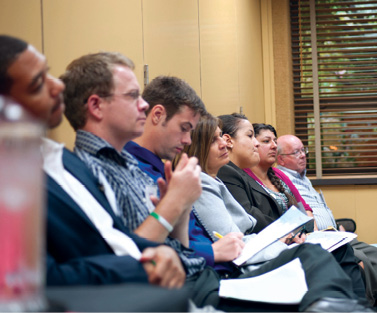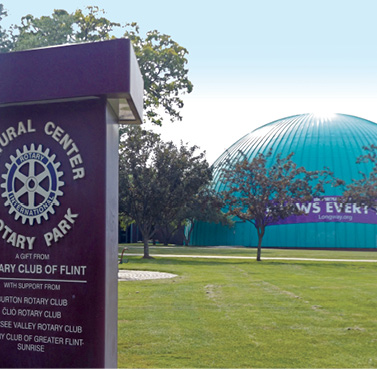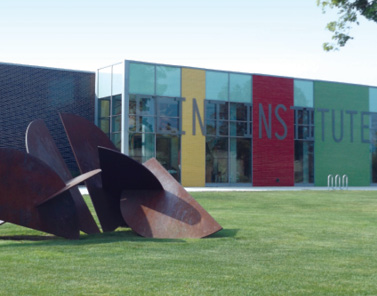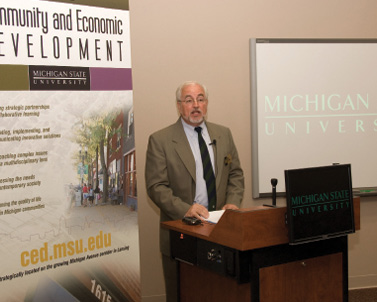The U.S. EDA Center For Regional Economic Innovation
The University Center for Regional Economic Innovation is a U.S. Department of Commerce, Economic Development Administration (EDA)-funded program of MSU's Center for Community and Economic Development. The program uses virtual peer networking and collaboration to apply Michigan's best and brightest new economic development thinking to some of Michigan's most economically distressed areas.
According to Rex LaMore, principal investigator and director of the REI Center, the U.S. EDA invites universities to collaborate with them in identifying new tools, models, policies, and practices that can stimulate economic growth within the state. "It's really about trying to address the challenges of people in rural and urban areas that still are in poverty," explained LaMore. "So we're collaborating with them and trying to discover, invent, and disseminate those new tools."
The REI Network and Collaborative Learning

Participants at Innovate! Michigan Summit.
The REI Center utilizes a model of collaborative learning (co-learning), in which members of its virtual network of over 1,000 professionals, practitioners, policy-makers, local government officials, and academics work collaboratively to conduct original, applied research on strategies that will support high-priority economic development. "The REI network helps us identify emerging opportunities and challenges," explained LaMore, "and assists us in learning about those and then disseminating what we're learning."
The end result of a co-learning project is the development of a co-learning plan, which is made available on the REI website, where it serves as a key resource for Michigan's professionals and policy-makers seeking to implement new ways of creating a vibrant community economy. It is also presented in full at the Center's annual Innovate Michigan! Summit, where, according to Jennifer Bruen, REI project coordinator, network members also have the opportunity to learn about, vote on, and network around new ideas. "The Summit is a perfect opportunity to learn new approaches or ways of augmenting the tools and tactics necessary to implement local, regional, and statewide economic development," she said.
Now in its fourth year, the REI Center is gearing up for implementation of completed co-learning plans. "A new element of the program this year is a co-implementation idea, where we'll work with a partner in a community to implement a co-learning plan that had been previously generated," said LaMore. "So they're going through the whole process—the conceptualization of the idea, the empirical analysis about what the new idea implies in terms of action and behavioral change, and then the actual implementation of the new idea to see if it in fact results in the outcomes that we seek. So we have the whole process of scholarly application."
Involving Students and Faculty

Longway Planetarium and Flint Institute of Arts at the Flint Cultural Center.
Besides facilitating co-learning projects, the REI Center gives Michigan college students, with faculty guidance, the opportunity to conduct strategic plans with a community partner to address a specific need. Each project selected is awarded up to $2,500 from REI. "The student-led/faculty-guided project is a technical assistance element of our project scope of work, where we're providing direct service to a local organization in our community on a need that they've identified," explained LaMore.
Mark Wilson, professor in MSU's School of Planning, Design, and Construction, oversees student-led projects through his Urban Planning 454 class. He has been involved with the Center for Community and Economic Development for over 20 years and appreciates the Center's focus on underserved communities. "In particular, I value the focus on Michigan communities and on some of the regional and social inequities that exist in the state," said Wilson.

MSU Center for Community and Economic Development on Michigan Avenue in Lansing.
He considers the student-led projects to be a mutually beneficial experience. "Student-led projects are a great initiative for several reasons," he explained, "including serving communities in Michigan, providing experience for students to engage with communities, and adding a practical element to the class."
One of Wilson's students, Joel Arnold, was part of a student-led, faculty-guided project in Fall Semester 2014 at the Flint Cultural Center in Flint, Michigan. While the Cultural Center campus houses a number of prestigious fine arts and cultural institutions, it isn't fully integrated into the city's geographic "fabric." "One of the main goals was making the Cultural Center an economic development engine that wasn't an island unto itself," said Arnold, "but instead enhanced the neighborhoods adjacent to it in a way that was consistent with the City of Flint's new Master Plan."
Arnold believes the project provided a great opportunity: "A lot of students come out of their majors and they haven't worked in their field. So being able to get that on-the-ground experience with the cultural center was a really cool opportunity to apply theory to practice, and actually take the things we're learning in the classroom and make them applicable to people's lives."

Rex LaMore, director and principal investigator of the U.S. EDA Center for Regional Economic Innovation.
Mike Brown, senior consultant of Municipal and Organizational Services at Prima Civitas, and a native of Flint, has a history of collaboration with REI and helped to make the connection between Wilson's UP454 class and the Flint Cultural Center. "Mark had done some work for Prima Civitas in Northeast Michigan that focused on the various tourist and recreational sites, including the bike trails," Brown explained. "Because of the work he had done there, we felt there was an opportunity at Flint Cultural Center. I was actually leading that work with the Cultural Center, doing a strategic plan for them, so it was just a good fit and the timing was right and we connected."
He said the goal of the project was to help develop a marketing plan for the various entities that make up the Flint Cultural Center. "The students came in and did a tour of all the institutions there, and then their job was to go back and do research," he explained. "Part of the focus was to help market the Flint Cultural Center better."
Brown believes the experience helped students gain a new perspective about Flint, which they can, in turn, project to others. "For Flint it's good because of the image and reputation. The students really couldn't believe what they were seeing, because I think they had an image of Flint," he said. "So for them to come and view Flint from a really different perspective, hands-on, and then see that kind of an asset...it's helpful to us!"
This hands-on perspective encourages next-generation "thinkers" to take a long-term interest in Michigan's communities.
"They have an investment in the communities," said Bruen, "and they take an interest in where that community would like to go in the future. Students sometimes get an internship or a job out of the project. Every time they complete a project we are able to find out what percentage of student teams want to stay in Michigan now because of their work in a community. So we're slowing the brain drain at least in a very small way."
A Scholarship of Economic Development
For LaMore, REI's long-term potential is that it looks beyond the invention and application of economic development to the scholarship of economic development. "The dominant model of what the University does in economic development is to invent some new thing: a new drug or a new gadget, and that's an important role," he said. "And as enterprises form around those concepts, then jobs are created and wealth is generated. But the actual policies and practices of economic development are not an area of substantial scholarly investigation. Often we don't apply scientific rigor to the practice of economic development in a systematic way. REI calls on us to think about what are the new tools and methods and policies and practices that'll create jobs and wealth generation, particularly in distressed areas. So we're using our intellectual capacity to create new products and processes that result in economic development success."
REI Co-Learning Plans for 2015
- An Assessment of the Effects of Mountain Biking in Marquette and on Michigan's Ecotourism Economy
- Pathways from Prison to Prosperity (P3): A Framework for Training Ex-Offenders to be Entrepreneurs in Legacy Cities
- Policies and Practices to Support Triple Bottom Line Development
- Publicly-Operated Telework Facilities: An Economic Development Opportunity for Michigan's Rural and Tourism-Oriented Communities
- Recycling Veterans
- The Impact of Employer Commitment vs. Workforce Development Training Programs in Michigan
- Written by Amy Byle, University Outreach and Engagement